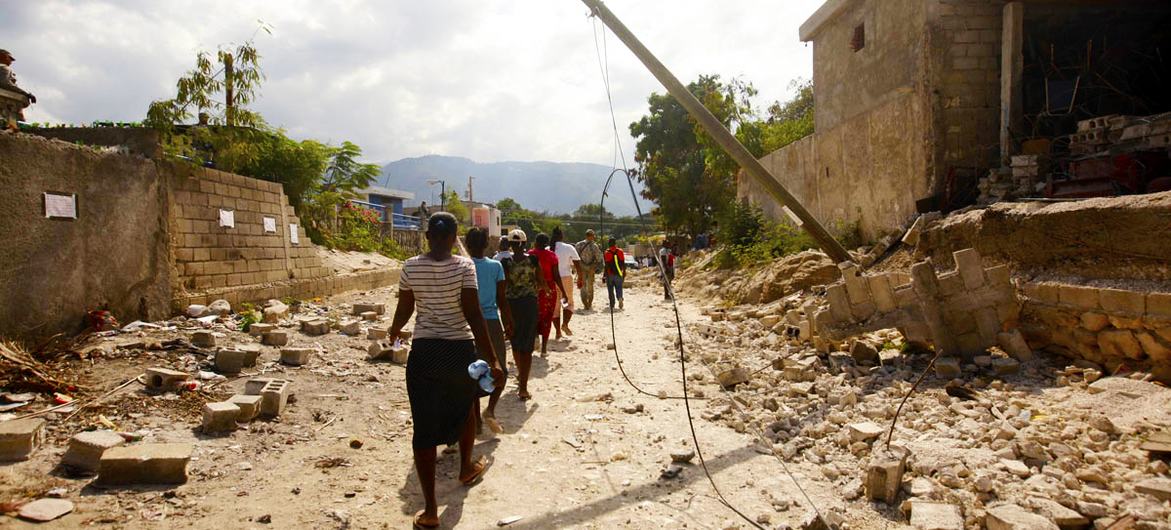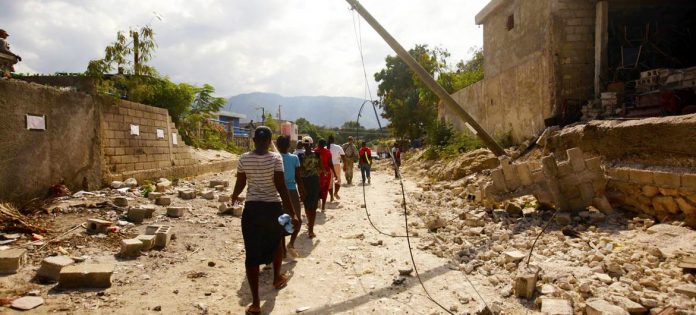Speaking from Zaporizhzhya on the front line in eastern Ukraine, Tom Fletcher reported that air strikes continue to “kill and cause huge civilian damage”.
While in the city – which is also close to Europe’s largest nuclear power plant of the same name which remains in Russian hands – the Emergency Relief Coordinator visited the site where a missile hit a medical clinic last month, destroying the facility and causing civilian casualties.
Mr. Fletcher said that Ukrainian communities have rallied round to support each other, just as the international community should do.
The destruction is such above ground that schools have been rebuilt metres below the surface to protect children and teachers from the ongoing war, he said, allowing around 1,000 children to be taught each day in Zaporizhzhya.
He also visited a collective site for the displaced, in Dnipro. At a transit centre in the city of Pavlohrad he saw how evacuees are receiving assistance, said his office for emergency relief coordination, OCHA.
Humanitarian plan for 2025
Mr. Fletcher will visit Kharkiv on Thursday. Together with the head of the UN refugee agency, UNHCR, Filippo Grandi, he will launch this year’s humanitarian and refugee response plans for Ukraine and the region. The pair are due to speak jointly to the press from the capital Kyiv just ahead of the launch.
Last year, UN aid teams and hundreds of partners reached more than eight million people with humanitarian assistance.
By November, this included nearly 364,000 people who received winter-related relief that included support for energy, non-food winter supplies and healthcare.
Guterres pays tribute to victims of Haiti earthquake
The UN Secretary-General António Guterres on Monday paid tribute to the victims of the devasting earthquake of 12 January, 2010, which claimed the lives of hundreds of thousands of people.
“The Secretary-General remembers the victims of the earthquake and continues to honour their legacy through the United Nations’ work in the country,” said UN Spokesperson Stéphane Dujarric, briefing reporters in New York.
The UN chief paid tribute to the 102 UN staffers who died, including the head of the Mission at the time, Mr. Hédi Annabi, “and we mourn with their families, their passing,” Mr. Dujarric continued.

The 2010 earthquake caused destruction across Haiti’s capital Port-au-Prince. (file)
Three million impacted
An estimated three million people were impacted by the earthquake, which led to severe humanitarian, protection, health, displacement, and infrastructural challenges for Haiti, some of which are still present today, the UN Spokesperson said.
The UN held a ceremony in Port-au-Prince on Sunday to honour the victims of the earthquake and the staffers who were killed.
In a statement, the head of the UN political office in Haiti, Maria Isabel Salvador, expressed her solidarity with all those whose lives continue to be impacted by the tragedy.
“She also saluted the determination and resilience of the Haitian people, who responded with courage in the aftermath of the earthquake,”, said Mr. Dujarric, and reaffirmed the UN’s commitment to continue working alongside the Haitian authorities and people.
$82 million committed to Sudan’s crippled health system
The World Bank, the World Health Organization (WHO) and the UN Children’s Fund (UNICEF) have signed an $82 million agreement known as the Sudan Health Assistance and Response in Emergencies (SHARE), to improve access to critical services for more than eight million people across Sudan.
As of now, more than 70 per cent of hospitals and health facilities in conflict-affected areas are non-operational. According to WHO, most of them lack necessary supplies or have been damaged or destroyed during the conflict.
“In Sudan, the systems providing vulnerable children and families with essential social services are on the brink of collapse,” said UNICEF Representative for Sudan Sheldon Yett.
Frontline workers, including nurses, doctors and other essential staff, have not been paid in months.
Health services decimated
The delivery of vaccine supplies and routine immunisation activities have also been hindered by security concerns and lack of access.
However, with limited access to safe water and adequate sanitation, especially in overcrowded displacement camps, recent disease outbreaks risk exacerbation.
An estimated 3.4 million children under the age of five are currently at high risk of disease including measles, malaria, pneumonia, diarrhoeal diseases and cholera.
With SHARE, UN agencies are now planning to provide essential medicines, train health workers, treat severe malnutrition and strengthen vaccination campaigns, while partners work towards enhancing disease surveillance systems.
“By investing in preparedness and resilience, we are paving the way for a stronger, more sustainable health system,” said WHO Representative in Sudan Dr. Shible Sahbani, emphasising the significance of the project.

